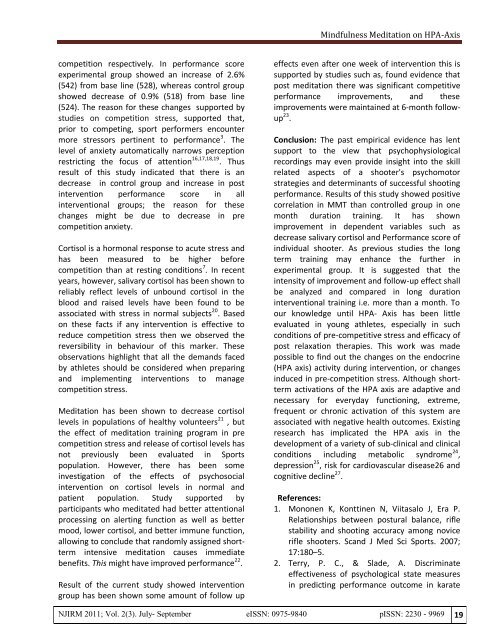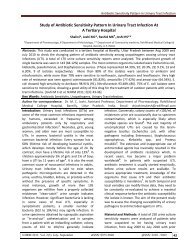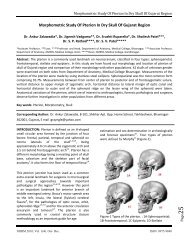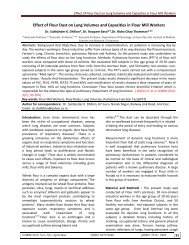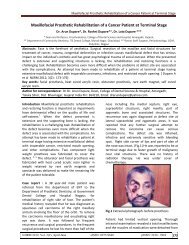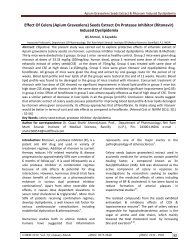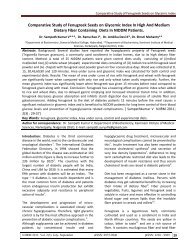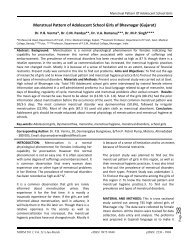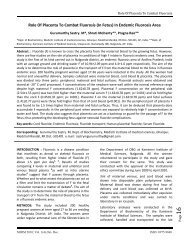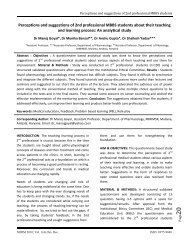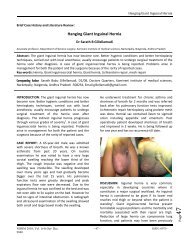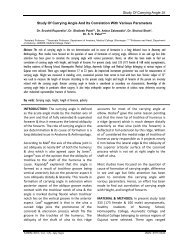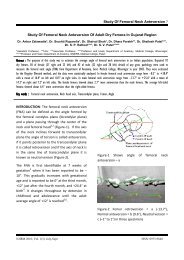The Effect of Mindfulness Meditation on HPA-Axis - National Journal ...
The Effect of Mindfulness Meditation on HPA-Axis - National Journal ...
The Effect of Mindfulness Meditation on HPA-Axis - National Journal ...
Create successful ePaper yourself
Turn your PDF publications into a flip-book with our unique Google optimized e-Paper software.
competiti<strong>on</strong> respectively. In performance score<br />
experimental group showed an increase <str<strong>on</strong>g>of</str<strong>on</strong>g> 2.6%<br />
(542) from base line (528), whereas c<strong>on</strong>trol group<br />
showed decrease <str<strong>on</strong>g>of</str<strong>on</strong>g> 0.9% (518) from base line<br />
(524). <str<strong>on</strong>g>The</str<strong>on</strong>g> reas<strong>on</strong> for these changes supported by<br />
studies <strong>on</strong> competiti<strong>on</strong> stress, supported that,<br />
prior to competing, sport performers encounter<br />
more stressors pertinent to performance 3 . <str<strong>on</strong>g>The</str<strong>on</strong>g><br />
level <str<strong>on</strong>g>of</str<strong>on</strong>g> anxiety automatically narrows percepti<strong>on</strong><br />
restricting the focus <str<strong>on</strong>g>of</str<strong>on</strong>g> attenti<strong>on</strong> 16,17,18,19 . Thus<br />
result <str<strong>on</strong>g>of</str<strong>on</strong>g> this study indicated that there is an<br />
decrease in c<strong>on</strong>trol group and increase in post<br />
interventi<strong>on</strong> performance score in all<br />
interventi<strong>on</strong>al groups; the reas<strong>on</strong> for these<br />
changes might be due to decrease in pre<br />
competiti<strong>on</strong> anxiety.<br />
Cortisol is a horm<strong>on</strong>al resp<strong>on</strong>se to acute stress and<br />
has been measured to be higher before<br />
competiti<strong>on</strong> than at resting c<strong>on</strong>diti<strong>on</strong>s 7 . In recent<br />
years, however, salivary cortisol has been shown to<br />
reliably reflect levels <str<strong>on</strong>g>of</str<strong>on</strong>g> unbound cortisol in the<br />
blood and raised levels have been found to be<br />
associated with stress in normal subjects 20 . Based<br />
<strong>on</strong> these facts if any interventi<strong>on</strong> is effective to<br />
reduce competiti<strong>on</strong> stress then we observed the<br />
reversibility in behaviour <str<strong>on</strong>g>of</str<strong>on</strong>g> this marker. <str<strong>on</strong>g>The</str<strong>on</strong>g>se<br />
observati<strong>on</strong>s highlight that all the demands faced<br />
by athletes should be c<strong>on</strong>sidered when preparing<br />
and implementing interventi<strong>on</strong>s to manage<br />
competiti<strong>on</strong> stress.<br />
<str<strong>on</strong>g>Meditati<strong>on</strong></str<strong>on</strong>g> has been shown to decrease cortisol<br />
levels in populati<strong>on</strong>s <str<strong>on</strong>g>of</str<strong>on</strong>g> healthy volunteers 21 , but<br />
the effect <str<strong>on</strong>g>of</str<strong>on</strong>g> meditati<strong>on</strong> training program in pre<br />
competiti<strong>on</strong> stress and release <str<strong>on</strong>g>of</str<strong>on</strong>g> cortisol levels has<br />
not previously been evaluated in Sports<br />
populati<strong>on</strong>. However, there has been some<br />
investigati<strong>on</strong> <str<strong>on</strong>g>of</str<strong>on</strong>g> the effects <str<strong>on</strong>g>of</str<strong>on</strong>g> psychosocial<br />
interventi<strong>on</strong> <strong>on</strong> cortisol levels in normal and<br />
patient populati<strong>on</strong>. Study supported by<br />
participants who meditated had better attenti<strong>on</strong>al<br />
processing <strong>on</strong> alerting functi<strong>on</strong> as well as better<br />
mood, lower cortisol, and better immune functi<strong>on</strong>,<br />
allowing to c<strong>on</strong>clude that randomly assigned shortterm<br />
intensive meditati<strong>on</strong> causes immediate<br />
benefits. This might have improved performance 22 .<br />
Result <str<strong>on</strong>g>of</str<strong>on</strong>g> the current study showed interventi<strong>on</strong><br />
group has been shown some amount <str<strong>on</strong>g>of</str<strong>on</strong>g> follow up<br />
<str<strong>on</strong>g>Mindfulness</str<strong>on</strong>g> <str<strong>on</strong>g>Meditati<strong>on</strong></str<strong>on</strong>g> <strong>on</strong> <strong>HPA</strong>-<strong>Axis</strong><br />
effects even after <strong>on</strong>e week <str<strong>on</strong>g>of</str<strong>on</strong>g> interventi<strong>on</strong> this is<br />
supported by studies such as, found evidence that<br />
post meditati<strong>on</strong> there was significant competitive<br />
performance improvements, and these<br />
improvements were maintained at 6-m<strong>on</strong>th followup<br />
23 .<br />
C<strong>on</strong>clusi<strong>on</strong>: <str<strong>on</strong>g>The</str<strong>on</strong>g> past empirical evidence has lent<br />
support to the view that psychophysiological<br />
recordings may even provide insight into the skill<br />
related aspects <str<strong>on</strong>g>of</str<strong>on</strong>g> a shooter's psychomotor<br />
strategies and determinants <str<strong>on</strong>g>of</str<strong>on</strong>g> successful shooting<br />
performance. Results <str<strong>on</strong>g>of</str<strong>on</strong>g> this study showed positive<br />
correlati<strong>on</strong> in MMT than c<strong>on</strong>trolled group in <strong>on</strong>e<br />
m<strong>on</strong>th durati<strong>on</strong> training. It has shown<br />
improvement in dependent variables such as<br />
decrease salivary cortisol and Performance score <str<strong>on</strong>g>of</str<strong>on</strong>g><br />
individual shooter. As previous studies the l<strong>on</strong>g<br />
term training may enhance the further in<br />
experimental group. It is suggested that the<br />
intensity <str<strong>on</strong>g>of</str<strong>on</strong>g> improvement and follow-up effect shall<br />
be analyzed and compared in l<strong>on</strong>g durati<strong>on</strong><br />
interventi<strong>on</strong>al training i.e. more than a m<strong>on</strong>th. To<br />
our knowledge until <strong>HPA</strong>- <strong>Axis</strong> has been little<br />
evaluated in young athletes, especially in such<br />
c<strong>on</strong>diti<strong>on</strong>s <str<strong>on</strong>g>of</str<strong>on</strong>g> pre-competitive stress and efficacy <str<strong>on</strong>g>of</str<strong>on</strong>g><br />
post relaxati<strong>on</strong> therapies. This work was made<br />
possible to find out the changes <strong>on</strong> the endocrine<br />
(<strong>HPA</strong> axis) activity during interventi<strong>on</strong>, or changes<br />
induced in pre-competiti<strong>on</strong> stress. Although shortterm<br />
activati<strong>on</strong>s <str<strong>on</strong>g>of</str<strong>on</strong>g> the <strong>HPA</strong> axis are adaptive and<br />
necessary for everyday functi<strong>on</strong>ing, extreme,<br />
frequent or chr<strong>on</strong>ic activati<strong>on</strong> <str<strong>on</strong>g>of</str<strong>on</strong>g> this system are<br />
associated with negative health outcomes. Existing<br />
research has implicated the <strong>HPA</strong> axis in the<br />
development <str<strong>on</strong>g>of</str<strong>on</strong>g> a variety <str<strong>on</strong>g>of</str<strong>on</strong>g> sub-clinical and clinical<br />
c<strong>on</strong>diti<strong>on</strong>s including metabolic syndrome 24 ,<br />
depressi<strong>on</strong> 25 , risk for cardiovascular disease26 and<br />
cognitive decline 27 .<br />
References:<br />
1. M<strong>on</strong><strong>on</strong>en K, K<strong>on</strong>ttinen N, Viitasalo J, Era P.<br />
Relati<strong>on</strong>ships between postural balance, rifle<br />
stability and shooting accuracy am<strong>on</strong>g novice<br />
rifle shooters. Scand J Med Sci Sports. 2007;<br />
17:180–5.<br />
2. Terry, P. C., & Slade, A. Discriminate<br />
effectiveness <str<strong>on</strong>g>of</str<strong>on</strong>g> psychological state measures<br />
in predicting performance outcome in karate<br />
NJIRM 2011; Vol. 2(3). July- September eISSN: 0975-9840 pISSN: 2230 - 9969 19


